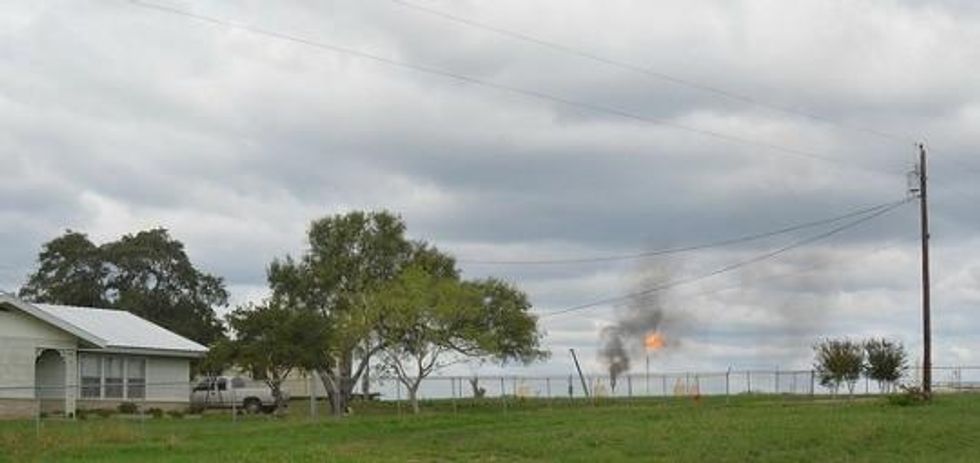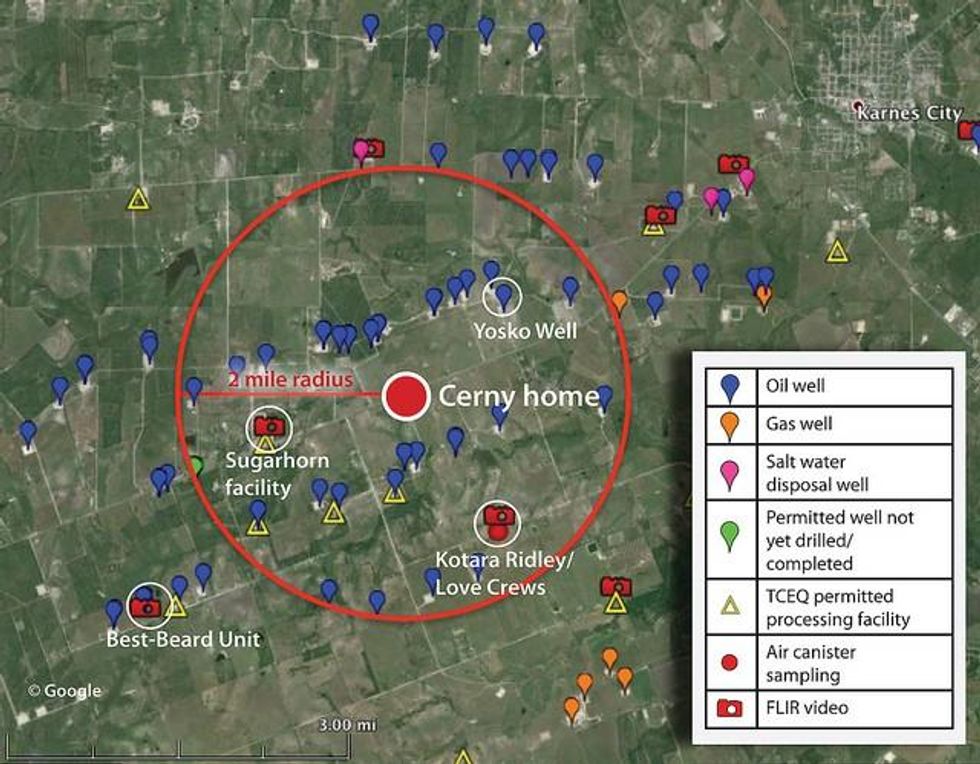

SUBSCRIBE TO OUR FREE NEWSLETTER
Daily news & progressive opinion—funded by the people, not the corporations—delivered straight to your inbox.
5
#000000
#FFFFFF
To donate by check, phone, or other method, see our More Ways to Give page.


Daily news & progressive opinion—funded by the people, not the corporations—delivered straight to your inbox.

While much of the reporting on the negative impact of fracking has focused on the danger it poses to drinking and groundwater resources, this eight-month, joint study by the Center for Public Integrity, Inside Climate News, and the Weather Channel reveals the lesser-known impact on air quality and the unchecked and potentially lethal amounts of toxic chemicals emitted from the wells.
"What's happening in the Eagle Ford is important not only for Texas, but also for Pennsylvania, Colorado, North Dakota and other states," where fracking has been sold as an "absolute-game changer" for often depressed rural regions.
Since 2008, over 7,000 oil and gas wells have been drilled in the Eagle Ford Shale and, with another 5,500 approved wells on the way, it has become "one of the most active drilling sites in America." And though the shale covers 20,000 square miles, the state has installed only five permanent air monitors, which reportedly sit on the "fringes of the shale play, far from the heavy drilling areas where emissions are highest."
According to the report, chemicals most commonly released during oil and gas extraction include:
hydrogen sulfide, a deadly gas found in abundance in Eagle Ford wells; volatile organic compounds (VOCs) like benzene, a known carcinogen; sulfur dioxide and particulate matter, which irritate the lungs; and other harmful substances such as carbon monoxide and carbon disulfide. VOCs also mix with nitrogen oxides emitted from field equipment to create ozone, a major respiratory hazard.
While there are some federal safety standards for workers who encounter these chemicals, there are no protections for people living near the drilling sites. Further, guidelines are typically set for one compound at a time without taking into account the impact of simultaneous exposure to multiple chemicals.
Through a series of interviews with area residents, the report describes a host of negative health impacts which include migraine headaches, nosebleeds and respiratory problems.
According to Robert Forbis Jr., an assistant professor of political science at Texas Tech University, the health issues faced by those living near drilling wells--not just in Texas but throughout country--"simply don't carry enough weight to counterbalance the financial benefits derived from oil and gas development."
"Energy wins practically every time," Forbis said. "It seems cynical to say that, but that's how states see it--promote economic development and minimize risk factors."
"This crap is killing me and my family," said Mike Cerny, a former oil company truck driver who lives a mile within 17 oil wells. The fumes from the nearby wells make Cerny and his wife "dizzy, irritable and nauseous," while their teenage son suffers from frequent nosebleeds.
"We went from nice, easy country living to living in a Petri dish," Myra said.

_____________________
Dear Common Dreams reader, The U.S. is on a fast track to authoritarianism like nothing I've ever seen. Meanwhile, corporate news outlets are utterly capitulating to Trump, twisting their coverage to avoid drawing his ire while lining up to stuff cash in his pockets. That's why I believe that Common Dreams is doing the best and most consequential reporting that we've ever done. Our small but mighty team is a progressive reporting powerhouse, covering the news every day that the corporate media never will. Our mission has always been simple: To inform. To inspire. And to ignite change for the common good. Now here's the key piece that I want all our readers to understand: None of this would be possible without your financial support. That's not just some fundraising cliche. It's the absolute and literal truth. We don't accept corporate advertising and never will. We don't have a paywall because we don't think people should be blocked from critical news based on their ability to pay. Everything we do is funded by the donations of readers like you. Will you donate now to help power the nonprofit, independent reporting of Common Dreams? Thank you for being a vital member of our community. Together, we can keep independent journalism alive when it’s needed most. - Craig Brown, Co-founder |

While much of the reporting on the negative impact of fracking has focused on the danger it poses to drinking and groundwater resources, this eight-month, joint study by the Center for Public Integrity, Inside Climate News, and the Weather Channel reveals the lesser-known impact on air quality and the unchecked and potentially lethal amounts of toxic chemicals emitted from the wells.
"What's happening in the Eagle Ford is important not only for Texas, but also for Pennsylvania, Colorado, North Dakota and other states," where fracking has been sold as an "absolute-game changer" for often depressed rural regions.
Since 2008, over 7,000 oil and gas wells have been drilled in the Eagle Ford Shale and, with another 5,500 approved wells on the way, it has become "one of the most active drilling sites in America." And though the shale covers 20,000 square miles, the state has installed only five permanent air monitors, which reportedly sit on the "fringes of the shale play, far from the heavy drilling areas where emissions are highest."
According to the report, chemicals most commonly released during oil and gas extraction include:
hydrogen sulfide, a deadly gas found in abundance in Eagle Ford wells; volatile organic compounds (VOCs) like benzene, a known carcinogen; sulfur dioxide and particulate matter, which irritate the lungs; and other harmful substances such as carbon monoxide and carbon disulfide. VOCs also mix with nitrogen oxides emitted from field equipment to create ozone, a major respiratory hazard.
While there are some federal safety standards for workers who encounter these chemicals, there are no protections for people living near the drilling sites. Further, guidelines are typically set for one compound at a time without taking into account the impact of simultaneous exposure to multiple chemicals.
Through a series of interviews with area residents, the report describes a host of negative health impacts which include migraine headaches, nosebleeds and respiratory problems.
According to Robert Forbis Jr., an assistant professor of political science at Texas Tech University, the health issues faced by those living near drilling wells--not just in Texas but throughout country--"simply don't carry enough weight to counterbalance the financial benefits derived from oil and gas development."
"Energy wins practically every time," Forbis said. "It seems cynical to say that, but that's how states see it--promote economic development and minimize risk factors."
"This crap is killing me and my family," said Mike Cerny, a former oil company truck driver who lives a mile within 17 oil wells. The fumes from the nearby wells make Cerny and his wife "dizzy, irritable and nauseous," while their teenage son suffers from frequent nosebleeds.
"We went from nice, easy country living to living in a Petri dish," Myra said.

_____________________

While much of the reporting on the negative impact of fracking has focused on the danger it poses to drinking and groundwater resources, this eight-month, joint study by the Center for Public Integrity, Inside Climate News, and the Weather Channel reveals the lesser-known impact on air quality and the unchecked and potentially lethal amounts of toxic chemicals emitted from the wells.
"What's happening in the Eagle Ford is important not only for Texas, but also for Pennsylvania, Colorado, North Dakota and other states," where fracking has been sold as an "absolute-game changer" for often depressed rural regions.
Since 2008, over 7,000 oil and gas wells have been drilled in the Eagle Ford Shale and, with another 5,500 approved wells on the way, it has become "one of the most active drilling sites in America." And though the shale covers 20,000 square miles, the state has installed only five permanent air monitors, which reportedly sit on the "fringes of the shale play, far from the heavy drilling areas where emissions are highest."
According to the report, chemicals most commonly released during oil and gas extraction include:
hydrogen sulfide, a deadly gas found in abundance in Eagle Ford wells; volatile organic compounds (VOCs) like benzene, a known carcinogen; sulfur dioxide and particulate matter, which irritate the lungs; and other harmful substances such as carbon monoxide and carbon disulfide. VOCs also mix with nitrogen oxides emitted from field equipment to create ozone, a major respiratory hazard.
While there are some federal safety standards for workers who encounter these chemicals, there are no protections for people living near the drilling sites. Further, guidelines are typically set for one compound at a time without taking into account the impact of simultaneous exposure to multiple chemicals.
Through a series of interviews with area residents, the report describes a host of negative health impacts which include migraine headaches, nosebleeds and respiratory problems.
According to Robert Forbis Jr., an assistant professor of political science at Texas Tech University, the health issues faced by those living near drilling wells--not just in Texas but throughout country--"simply don't carry enough weight to counterbalance the financial benefits derived from oil and gas development."
"Energy wins practically every time," Forbis said. "It seems cynical to say that, but that's how states see it--promote economic development and minimize risk factors."
"This crap is killing me and my family," said Mike Cerny, a former oil company truck driver who lives a mile within 17 oil wells. The fumes from the nearby wells make Cerny and his wife "dizzy, irritable and nauseous," while their teenage son suffers from frequent nosebleeds.
"We went from nice, easy country living to living in a Petri dish," Myra said.

_____________________